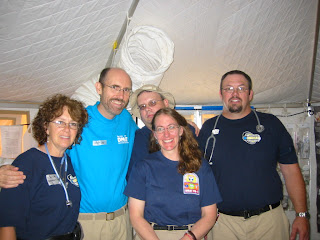In January 2009, I was bragging about John to our EM residency applicants on the hospital campus tour. "He's an important leader in San Francisco AND works at the General... yada yada yada." And right on cue, he passed by us, riding his old bike and rang a cute little bicycle bell. Ding ding. "And he's the one of the nicest guys you'll ever meet."
 John is in the light blue shirt at New Orleans as part
John is in the light blue shirt at New Orleans as part of the DMAT team after hurricane Katrina.
Medical Director, San Francisco EMS Agency
SFGH Emergency Department
EM Residency: Naval Hospital San Diego
EMS Fellowship: University of Arizona, Tucson
John, what’s your academic niche and how did you decide on it?
During my residency, I noticed that the patients who were the sickest were saved or lost by the prehospital providers; i.e. if they reached us in the ED with ROSC (return of spontaneous circulation) we had a chance to resuscitate them, but if they were pulseless and apneic we were never successful in our care. The practice of good Emergency Medicine is highly dependent on a good EMS System, and most Emergency Physicians don't concern themselves with this aspect of the practice! I saw a neglected opportunity and an area where a lot of heavy lifting needed to be done, and I went for it. Having a great EMS rotation as a resident helped as well, and my first job in EM directing the small Emergency Department at the US Naval Hospital in Subic Bay, Republic of the Philippines, both cemented my interest and so I pursued fellowship training.
Who were your mentors and what good advice did you get?
I have been fortunate to have many mentors in my career. Steve Monson and Gary Lammert at the Naval Hospital San Diego taught me the value of being a "dumb dedicated doctor", i.e. focusing on strong basics of care and constancy of attention to the mission at hand (instead of the politics du jour).
Doug Lindsey, Dan Spaite and Terry Valenzuela at the University of Arizona taught me the many permutations of EMS and disaster medicine, and an organized approach to the field, concentrating in those areas that are most important and need good medical oversight (instead of "data mining").
Bob Swor at the University of Michigan has given me good advice on EMS research. Mitch Katz at SF Department of Public Health has helped me to learn the political ropes. Andy Stevermer at the National Disaster Medical System has taught me a lot about providing medical care under austere conditions and having a good time doing it. And Howard Graves at SFGH has taught me how to flourish and thrive while providing patient-focused care in the sometimes chaotic environment of our Emergency Department.
Several of my mentors are still in my life, some have retired, one has died, but they all are an important part of my educational experience.
What’s a project that you are working on now?
A project that I'm particularly excited about is our combined efforts at UCSF/SFGH Emergency Medicine to provide a full spectrum of EMS/disaster education. We have had several medical students take an EMS/disaster elective supervised by Clement Yeh. We'll also be having two of our EM second-year residents, Swati Singh and Jennifer Wilson, start an Area of Distinction in EMS/Disaster this August.
 Doing disaster training in Odessa, Ukraine
Doing disaster training in Odessa, Ukraine (Wait, is that the same light blue shirt as above, John?!)
 EM relief work in Haiti
EM relief work in Haiti







